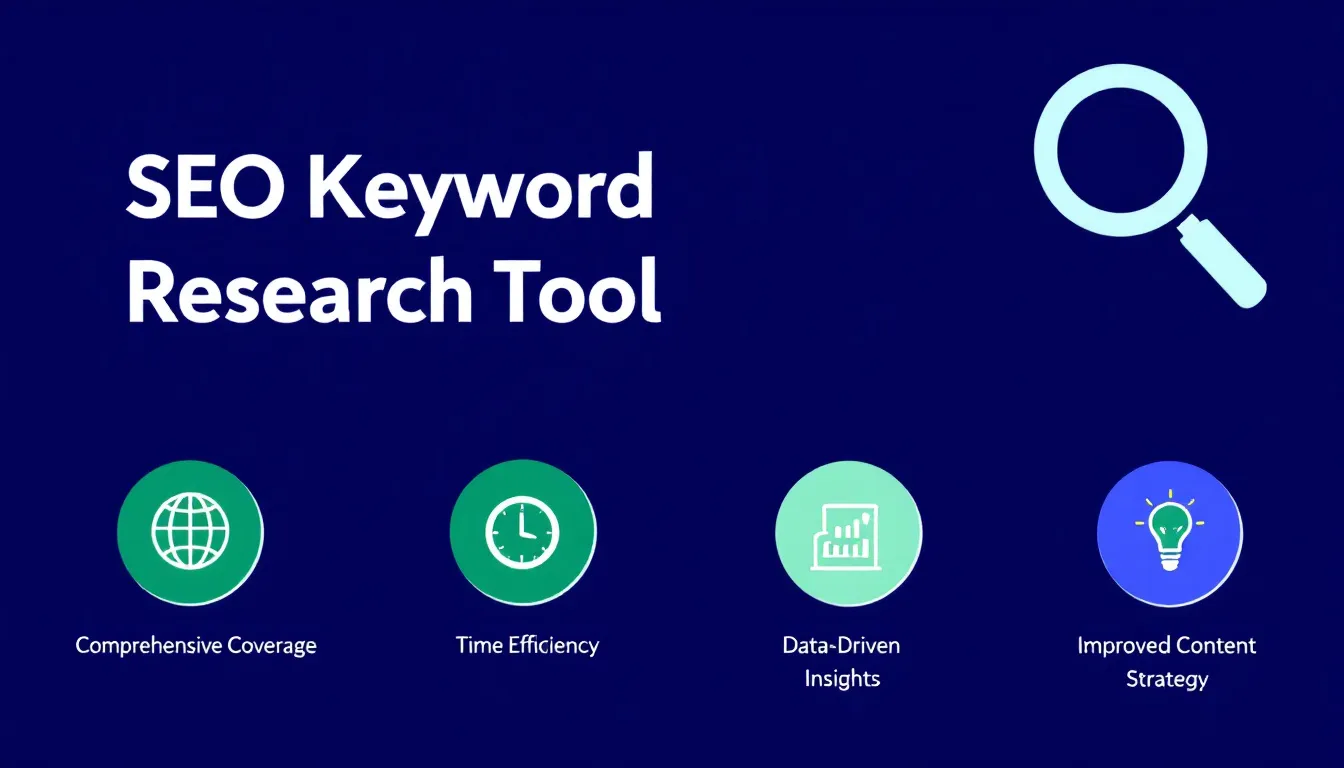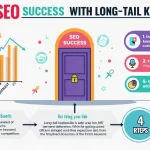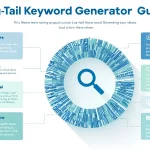SEO Keyword Research Tool
Is this tool helpful?
How to Use the SEO Keyword Research Tool Effectively
Our SEO Keyword Research Tool is designed to help you generate a comprehensive list of keywords related to your chosen topic. Here’s a step-by-step guide on how to use this tool effectively:
- Enter the main topic: In the first field, input the primary subject for your keyword research. For example, you might enter “Sustainable Fashion” or “Cloud Computing Solutions”.
- Specify the search intent (optional): If you want to focus on a particular type of search intent, enter it in the second field. Examples could include “product comparisons” or “how-to guides”.
- Choose keyword types (optional): In the third field, you can specify the types of keywords you’re interested in. For instance, you might enter “long-tail, question-based” or “branded, commercial”.
- Define your industry or niche (optional): To further refine your results, enter your specific industry or niche in the fourth field. Examples could be “Eco-friendly Fashion Retail” or “Enterprise Software Solutions”.
- Generate the keyword list: Click the “Generate Keyword List” button to process your request.
- Review and analyze the results: Once generated, review the comprehensive list of keywords provided. The tool will organize them by relevance, search volume, and other important metrics.
- Copy and save your results: Use the “Copy to Clipboard” button to easily transfer the keyword list to your preferred document or tool for further analysis and strategy development.
By following these steps, you’ll be able to generate a tailored list of keywords that can significantly enhance your SEO strategy and content planning efforts.
Unlocking the Power of SEO: Your Ultimate Keyword Research Companion
In the ever-evolving landscape of digital marketing, search engine optimization (SEO) remains a cornerstone of online success. At the heart of effective SEO lies the art and science of keyword research – a process that can make or break your visibility in search engine results pages (SERPs). Our SEO Keyword Research Tool is designed to be your ultimate companion in this crucial endeavor, empowering you to uncover a treasure trove of relevant, high-potential keywords that can drive organic traffic to your website.
This powerful tool goes beyond simple keyword suggestions. It’s a comprehensive solution that combines advanced algorithms, real-time data, and industry best practices to deliver a list of keywords that are not just relevant to your topic, but also aligned with user intent, search trends, and potential for conversion. Whether you’re a seasoned SEO professional, a content marketer, or a business owner looking to improve your online presence, our tool provides the insights you need to make informed decisions and stay ahead of the competition.
The Purpose and Benefits of Our SEO Keyword Research Tool
The primary purpose of our SEO Keyword Research Tool is to streamline and enhance the keyword discovery process, allowing you to:
- Identify a wide range of relevant keywords, from high-volume head terms to niche long-tail phrases
- Understand user intent behind searches related to your topic
- Discover new content opportunities and gaps in your current SEO strategy
- Analyze keyword difficulty and competition levels
- Prioritize keywords based on their potential ROI and alignment with your goals
- Stay updated with the latest search trends and user behavior in your industry
By leveraging these benefits, you can create more targeted content, optimize your website more effectively, and ultimately improve your search engine rankings and organic traffic.
The Benefits of Using Our SEO Keyword Research Tool
1. Time and Resource Efficiency
Manual keyword research can be an incredibly time-consuming process. Our tool automates much of this work, allowing you to generate comprehensive keyword lists in a fraction of the time it would take to do so manually. This efficiency translates directly into resource savings, enabling you to allocate more time and effort to strategy development and content creation.
2. Data-Driven Decision Making
With access to real-time data and advanced metrics, our tool empowers you to make informed decisions based on actual search behavior and trends. This data-driven approach minimizes guesswork and helps you focus your efforts on keywords with the highest potential for success.
3. Comprehensive Keyword Coverage
Our tool doesn’t just scratch the surface; it dives deep into your topic to uncover a wide range of keywords, including:
- Short-tail and long-tail keywords
- Question-based queries
- Latent Semantic Indexing (LSI) keywords
- Branded and non-branded terms
- Location-based keywords (if applicable)
This comprehensive coverage ensures that you don’t miss out on valuable opportunities to connect with your target audience.
4. Improved Content Strategy
By understanding the variety of keywords and search intents related to your topic, you can develop a more robust content strategy. This insight allows you to create content that not only ranks well but also meets the specific needs and interests of your audience, improving engagement and conversion rates.
5. Competitive Edge
Our tool provides insights into keyword difficulty and competition levels, allowing you to identify opportunities where you can outrank competitors. By focusing on these strategic keywords, you can carve out a niche for your brand and establish authority in your industry.
6. Adaptability to Market Changes
Search trends and user behavior are constantly evolving. Our tool updates its data regularly, ensuring that you always have access to the most current keyword information. This adaptability helps you stay agile and adjust your SEO strategy in response to market changes.
7. Enhanced Local SEO
For businesses targeting specific geographic areas, our tool can help identify location-based keywords, improving your local SEO efforts and helping you connect with customers in your target markets.
Addressing User Needs and Solving Specific Problems
Our SEO Keyword Research Tool is designed to address several common challenges faced by marketers, content creators, and business owners in the digital space:
1. Overcoming Keyword Blindness
Many users struggle with “keyword blindness” – the inability to think beyond obvious, high-competition keywords. Our tool solves this by generating a diverse range of keywords, including long-tail phrases and semantic variations that you might not have considered otherwise.
Example:
Let’s say you’re researching keywords for a vegan bakery. Instead of just focusing on obvious terms like “vegan cakes” or “dairy-free pastries”, our tool might suggest phrases like:
- “Gluten-free vegan birthday cake delivery”
- “Egg-free cupcakes for allergy sufferers”
- “How to order custom vegan wedding desserts”
2. Aligning Content with Search Intent
Understanding user intent is crucial for creating content that ranks well and meets user needs. Our tool categorizes keywords based on search intent (informational, navigational, transactional, or commercial), helping you tailor your content strategy accordingly.
Example:
For a topic like “smartphone photography”, our tool might categorize keywords as follows:
- Informational: “How to take better photos with your smartphone”
- Transactional: “Best smartphone camera lenses to buy”
- Commercial: “Smartphone photography courses near me”
3. Identifying Content Gaps
By providing a comprehensive view of the keyword landscape in your niche, our tool helps you identify topics and questions that your content strategy might be missing, allowing you to fill these gaps and capture more organic traffic.
4. Prioritizing SEO Efforts
With limited time and resources, it’s crucial to focus on the most impactful keywords. Our tool provides metrics like search volume, keyword difficulty, and potential click-through rates, helping you prioritize your SEO efforts for maximum ROI.
5. Adapting to Algorithm Changes
Search engine algorithms are constantly evolving, and what worked yesterday might not work tomorrow. Our tool stays updated with the latest SEO trends and algorithm changes, helping you adapt your strategy to maintain and improve your search rankings.
Practical Applications and Use Cases
Our SEO Keyword Research Tool has a wide range of practical applications across various industries and use cases. Here are some examples of how different professionals can leverage this tool to enhance their digital marketing efforts:
1. E-commerce Product Optimization
For online retailers, optimizing product pages is crucial for visibility in search results. Let’s consider an example of an e-commerce store selling eco-friendly home products:
Scenario: The store wants to improve the visibility of their bamboo toothbrush product page.
How the tool helps:
- Generates a list of relevant keywords like “biodegradable toothbrush”, “plastic-free oral care”, “eco-friendly dental products”
- Identifies long-tail keywords such as “best bamboo toothbrush for sensitive gums” or “how long do bamboo toothbrushes last”
- Suggests related product keywords like “bamboo toothbrush holder” or “natural toothpaste for bamboo brushes”
Outcome: The e-commerce store can use these insights to optimize their product titles, descriptions, and create supporting content that addresses common questions and related topics, potentially increasing organic traffic and sales.
2. Content Marketing Strategy Development
Content marketers can use the tool to plan and create more targeted, SEO-friendly content. Let’s look at an example for a fitness blog:
Scenario: A fitness blogger wants to create a series of articles about home workouts.
How the tool helps:
- Provides a range of related topics like “bodyweight exercises for beginners”, “HIIT workouts without equipment”, “how to stay motivated for home workouts”
- Identifies trending questions such as “Can I lose weight with just home workouts?” or “What’s the best time of day for home exercise?”
- Suggests seasonal keywords like “summer home workout routines” or “indoor exercises for winter”
Outcome: The blogger can create a comprehensive content calendar addressing various aspects of home workouts, ensuring they cover topics that their audience is actively searching for throughout the year.
3. Local Business SEO
Local businesses can use the tool to improve their visibility in local search results. Consider this example of a family-owned Italian restaurant:
Scenario: A restaurant in Chicago wants to attract more local customers through organic search.
How the tool helps:
- Generates location-based keywords like “best Italian restaurant in Chicago”, “authentic pasta near me”, “family-friendly dining in Chicago Loop”
- Identifies local event-related keywords such as “pre-theater dinner spots Chicago” or “romantic Valentine’s Day restaurants downtown”
- Suggests question-based keywords like “Where to find the best tiramisu in Chicago?” or “What’s the most authentic Italian restaurant in the city?”
Outcome: The restaurant can optimize their website and Google My Business listing with these keywords, create location-specific content, and potentially capture more local search traffic.
4. B2B Lead Generation
B2B companies can leverage the tool to improve their content marketing and lead generation efforts. Let’s look at an example for a cloud computing solutions provider:
Scenario: A B2B company wants to generate more leads for their enterprise cloud solutions.
How the tool helps:
- Identifies industry-specific keywords like “enterprise cloud migration strategies”, “hybrid cloud solutions for finance sector”, “multi-cloud management tools”
- Suggests problem-solving keywords such as “how to reduce cloud computing costs” or “securing sensitive data in the cloud”
- Provides comparison keywords like “on-premise vs cloud infrastructure pros and cons” or “top enterprise cloud providers comparison”
Outcome: The company can create in-depth whitepapers, case studies, and blog posts targeting these keywords, positioning themselves as thought leaders in the industry and attracting potential leads searching for cloud computing solutions.
Frequently Asked Questions (FAQ)
Q1: How often should I conduct keyword research?
A1: The frequency of keyword research depends on your industry and goals, but generally, it’s recommended to review and update your keyword strategy at least quarterly. For rapidly changing industries or during major market shifts, more frequent research may be beneficial. Regular keyword research helps you stay on top of changing search trends and user behavior.
Q2: Can I use the same keywords for all my web pages?
A2: While some overlap is natural, it’s best to focus on different primary keywords for each page to avoid keyword cannibalization. This strategy helps search engines understand the unique purpose of each page and improves your chances of ranking for a wider range of relevant searches.
Q3: How many keywords should I target on a single page?
A3: It’s generally recommended to focus on one primary keyword and 2-4 related secondary keywords per page. This allows you to create focused, high-quality content without keyword stuffing. Remember, modern SEO is more about topics and user intent than exact keyword matches.
Q4: Are long-tail keywords really worth targeting?
A4: Absolutely! Long-tail keywords often have lower search volumes but higher conversion rates because they’re more specific to user intent. They’re also typically less competitive, making it easier to rank for them. A balanced strategy including both short and long-tail keywords is often most effective.
Q5: How do I choose between keywords with similar meanings?
A5: Consider factors like search volume, competition, and relevance to your specific content. Also, look at the search intent behind each keyword – they may seem similar but could be targeting different stages of the buyer’s journey. Our tool provides metrics to help you make informed decisions in such cases.
Q6: Can keyword research help with paid advertising campaigns?
A6: Definitely! Keyword research is crucial for both organic SEO and paid search campaigns. The insights gained from our tool can help you identify valuable keywords for PPC campaigns, improve your ad copy, and potentially lower your cost per click by targeting more specific, less competitive phrases.
Q7: How does voice search impact keyword research?
A7: Voice search is increasing the importance of natural language and question-based keywords. Our tool takes this trend into account, providing question-format and conversational keywords that align with voice search queries. This helps you optimize your content for both traditional and voice-based searches.
Q8: Is it necessary to use exact keyword matches in my content?
A8: While including exact matches can be beneficial, modern search engines are sophisticated enough to understand context and semantically related terms. Focus on creating high-quality, relevant content that naturally incorporates your target keywords and their variations, rather than forcing exact matches at the expense of readability.
Q9: How can I use keyword research for content ideation?
A9: Keyword research is an excellent tool for content ideation. Look for patterns in the keywords, identify questions your audience is asking, and use related terms to brainstorm topic clusters. Our tool’s comprehensive results can inspire new content ideas you might not have considered otherwise.
Q10: Can keyword research help with understanding my target audience?
A10: Absolutely! Keyword research provides valuable insights into what your target audience is searching for, their pain points, and their interests. By analyzing the keywords and questions they use, you can gain a deeper understanding of your audience’s needs and tailor your content and products accordingly.
By leveraging our SEO Keyword Research Tool and following these best practices, you’ll be well-equipped to develop a robust, data-driven SEO strategy that drives organic traffic and helps you achieve your digital marketing goals.
Important Disclaimer
The calculations, results, and content provided by our tools are not guaranteed to be accurate, complete, or reliable. Users are responsible for verifying and interpreting the results. Our content and tools may contain errors, biases, or inconsistencies. We reserve the right to save inputs and outputs from our tools for the purposes of error debugging, bias identification, and performance improvement. External companies providing AI models used in our tools may also save and process data in accordance with their own policies. By using our tools, you consent to this data collection and processing. We reserve the right to limit the usage of our tools based on current usability factors. By using our tools, you acknowledge that you have read, understood, and agreed to this disclaimer. You accept the inherent risks and limitations associated with the use of our tools and services.







